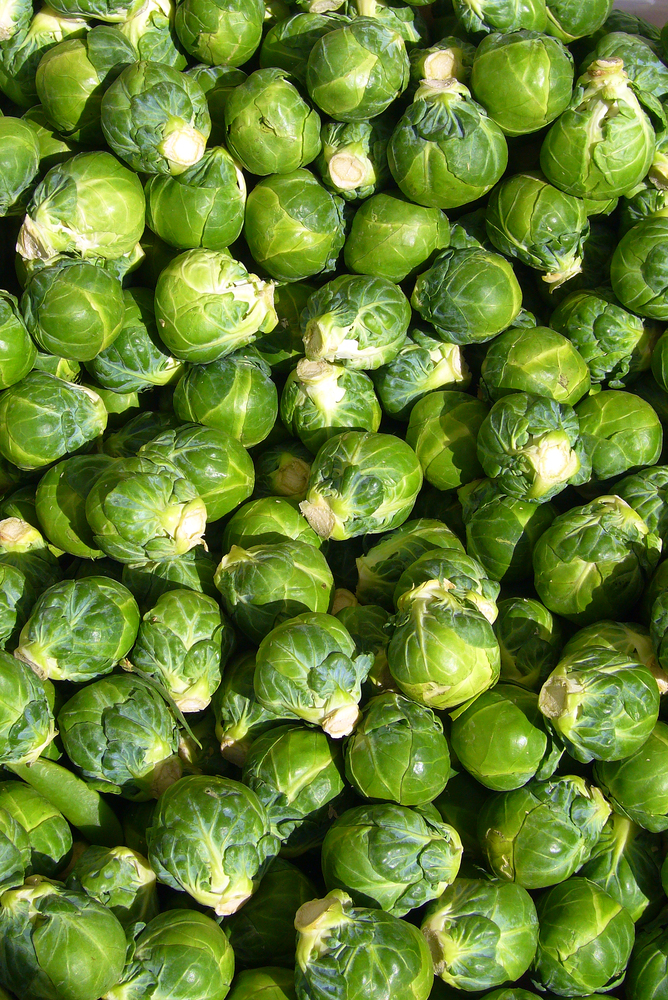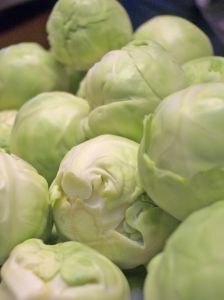Nutritious Sprouts and how to keep them that way
Interview with
 Ben - Christmas is a time of many traditions and one of these is, of course, your Christmas dinner. Christmas dinner wouldn't be a true Christmas dinner without Brussels sprouts. Love them or hate them they're almost always there on your plate come Christmas and you have to eat one or two. If you are going to eat sprouts what's the best way to cook them and still keep all of their nutritional value? I went to the Medical Research Council's Human Nutrition Research labs in Cambridge and met up with Kate Guberg who set up an experiment to help us find out.
Ben - Christmas is a time of many traditions and one of these is, of course, your Christmas dinner. Christmas dinner wouldn't be a true Christmas dinner without Brussels sprouts. Love them or hate them they're almost always there on your plate come Christmas and you have to eat one or two. If you are going to eat sprouts what's the best way to cook them and still keep all of their nutritional value? I went to the Medical Research Council's Human Nutrition Research labs in Cambridge and met up with Kate Guberg who set up an experiment to help us find out.
Kate - I divided the sprouts into five different groups: frozen sprouts, raw sprouts, oiled sprouts, microwaved sprouts and steamed sprouts. They were then homogenized in an acid to produce the vitamin C that was remaining.
Ben - So why are we looking for the amount of vitamin C in these sprouts?
Kate - Obviously cooking, anything you do to the Brussels sprout will actually affect the amount of vitamins in that vegetable. We want to see what's left after various ways of cooking.
Ben - Can you consider the same thing for other vitamins or will this only show us for vitamin C?
Kate - All the other water soluble vitamins will be affected in a similar way by the leaching of the water. When you cook them, they'll be lost into the water as well. It'll give us an idea perhaps of what's left of the other vitamins.
Ben - What's the next step now then?
Kate - I'm going to react it with various chemicals to give a fluorescent colour which we can measure to give an idea of the amount of vitamin C that's left in the vegetables themselves.
Ben - So you measure chemicals that will make vitamin C glow, effectively. By recording quite how bright the glow is, that shows you how much vitamin C is left.
Kate - That's right. We also have various amounts that we know of vitamin C and we can compare the amount of glowing that we get with the known amount. That will give us an absolute figure that we can use to calculate the vitamin C levels.
Ben - While we wait to find out how much vitamin C is in different types of sprouts I met up with Toni Steer who works here at the MRC HNR. Toni it's Christmas time, traditionally a time to be stuffing our faces with rich, fatty foods. What can people do to avoid poor nutrition at Christmas?
 Toni - The reality is Christmas day is a once-off. It happens once a year. Really, it's time to enjoy yourself and have a great day. I think the problem happens when Christmas day turns into a whole month. One of the big culprits here is the buffet.
Toni - The reality is Christmas day is a once-off. It happens once a year. Really, it's time to enjoy yourself and have a great day. I think the problem happens when Christmas day turns into a whole month. One of the big culprits here is the buffet.
Ben - Buffets are very popular at office Christmas parties and that sort of thing so what's the problem with the buffet?
Toni - If you imagine walking into a room with a buffet table and it has nothing but cheese sandwiches on, how many cheese sandwiches would you really eat? Probably not very many. Now you imagine the same room again. You go in and the buffet table is covered with a whole variety of foods: sausage rolls, mince pies, crisps, nuts, biscuits. Now imagine how much you would eat.
Ben - I think I'd fill my plate a couple of times with that sort of choice.
Toni - Absolutely. The more variety you have the more likely you are to eat too much. Remember, if you're going to a party it's a social situation. You're there to have a really good chat with your friends so make sure you do more talking than eating.
Ben - So now we have our sprout results back we can see what difference it makes with the different cooking mechanisms. What have we actually found?
Kate - There's no real surprises. We can see that cooking sprouts, no matter what method you use, does result in a loss of vitamin C. Boiling the sprouts actually lost up to 60% of the vitamin C. That's really gone into the water. The water you throw away down your sink contains the vitamin C that you could have had in your body. The steaming, we saw a loss of 40%. Microwaving, we have very similar results.
Ben - So any form of cooking Brussels sprouts seems to reduce the amount of vitamin C in there quite a lot. You said you also got some fresh ones and froze them. What difference does it make to freeze them?
Kate - Actually, I was quite surprised. The frozen Brussels sprouts showed a loss of 30% of vitamin C so obviously, if you then go on to cook those Brussels sprouts you're going to see even more of a loss. I think the message is that the best is fresh.
Ben - By the looks of it the best way to get lots of vitamin C is to eat raw sprouts. Maybe we should just give up on sprouts and eat oranges. They're rich in vitamin C, aren't they?
Kate - Actually, it's funny but Brussels sprouts are very rich in vitamin C, more so than oranges. They actually contain more vitamin C than oranges. Even with the loss of vitamin C in cooking a portion of Brussels sprouts is going a long way to fulfilling your daily requirement which is 40mg per day. I think the message is that no matter how you cook them, they are still worth eating. It's definitely worth trying to get your children to eat Brussels sprouts even if they only managed the odd one or two.
- Previous Quirkology
- Next Gastroenteritis and Noroviruses









Comments
Add a comment